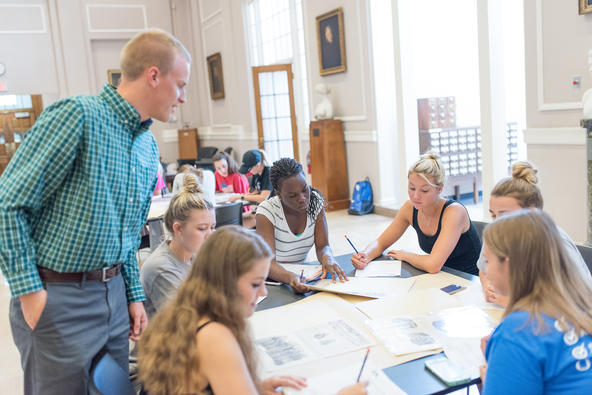UK Libraries Participates in International Study to Examine Value in Teaching With Primary Sources

Over the past year, librarians at institutions across the globe have been working to digitize and make available an unparalleled amount of primary collections to facilitate remote instruction and research. Now, as higher education begins to shift back to in-person learning, librarians will be able to adapt once again to the needs of instructors teaching undergraduates with primary sources thanks to an international cohort comprising teams at University of Kentucky Libraries and other academic libraries across the United States and United Kingdom.
Compiled by ITHAKA S+R, this two-year study summarizes the findings from 26 research teams, synthesizing over 300 interviews with faculty and instructors who teach with primary sources across several disciplines.
UK Libraries’ research team included four members of the Special Collections Research Center (SCRC), Jay-Marie Bravent in Research Services and Education, Danielle Gabbard in the Louie B. Nunn Center for Oral History, Deirdre Scaggs, associate dean, and Matthew Strandmark, education archivist.
The local study conducted interviews in December 2019 and January 2020, seeking to better understand the needs of undergraduate instructors at the University of Kentucky in order to improve services, develop additional resources and expand the effectiveness of teaching with primary sources. During the early months of the COVID-19 pandemic, the SCRC team completed the interview transcription, coding and analysis, compiling their findings into a local report.
“Completing the majority of this research during the pandemic and Black Lives Matter movement created a heightened awareness of the importance of primary sources beyond the scope of teaching undergraduates, both culturally and politically,” said Bravent, the primary investigator on the project. “The video showing the killing of George Floyd is a primary source that has changed the world … we have long taught that primary sources have power, the importance of that has never been clearer.”
The team conducted 16 interviews with UK faculty and instructors, whose responses revealed the value of teaching with primary sources as well as potential areas for improvement for supporting these teaching methods in the future.
Among the findings of the study, most participants recognized that primary sources were essential to experiential learning and often tied the use and examination of primary sources in their classes to learning outcomes focused on civil engagement, critical thinking and source analysis, empathy development, and the identification of bias.
Most study participants also relied on close relationships with partners in special collections libraries and on the expertise of archivists, librarians and paraprofessional staff.
“This was a valuable project because it showed us what faculty members and instructors value most about our teaching partnerships. It also showed the areas where we can improve or alter our practices to be sure we are meeting the needs of students as they learn about primary source research,” Strandmark said.
A potential area for improvement the team identified in the study was aiding the navigation of online databases and tools. Participants on average valued hands-on activities with primary sources more than digital interactions, despite the majority of participants recognizing the value, benefits and growing body of authentic primary sources available online.
“We are so thankful to our faculty and instructor collaborators for the trust they place in us, and for the opportunity to take part in so many diverse and exciting courses offered at the University of Kentucky,” Strandmark continued. “We don’t often get the chance to see the ‘forest through the trees’ so this project allowed us to step back and make programmatic decisions about the future directions of our program and how we can best serve our constituencies on campus.”
A digital copy of the local report is now available through UK Libraries’ UKnowledge. Findings from the international study may be accessed through ITHAKA S+R’s publications or blog on the organization’s website.
ITHAKA S+R is part of ITHAKA, a not-for-profit organization helping academia “use digital technologies to preserve the scholarly record and to advance research and technology in sustainable ways.” ITHAKA S+R supports institutions by generating action-oriented research and guiding collaboration across academic communities.
The Special Collections Research Center at UK Libraries sustains the Commonwealth’s memory and serves as the essential bridge between past, present and future. By preserving materials documenting the social, cultural, economic and political history of Kentucky, the center provides rich opportunities for students to expand their worldview and enhance their critical thinking skills. Special Collections Research Center materials are used by scholars worldwide to advance original research and pioneer creative approaches to scholarship. UK Libraries’ Special Collections Research Center is the Archives, the Louie B. Nunn Center for Oral History, the King Library Press, the Wendell H. Ford Public Policy Research Center, the Bert T. Combs Appalachian Collection, the John G. Heyburn Initiative and ExploreUK.
Credits
MiKayla Carter (University of Kentucky Libraries)
